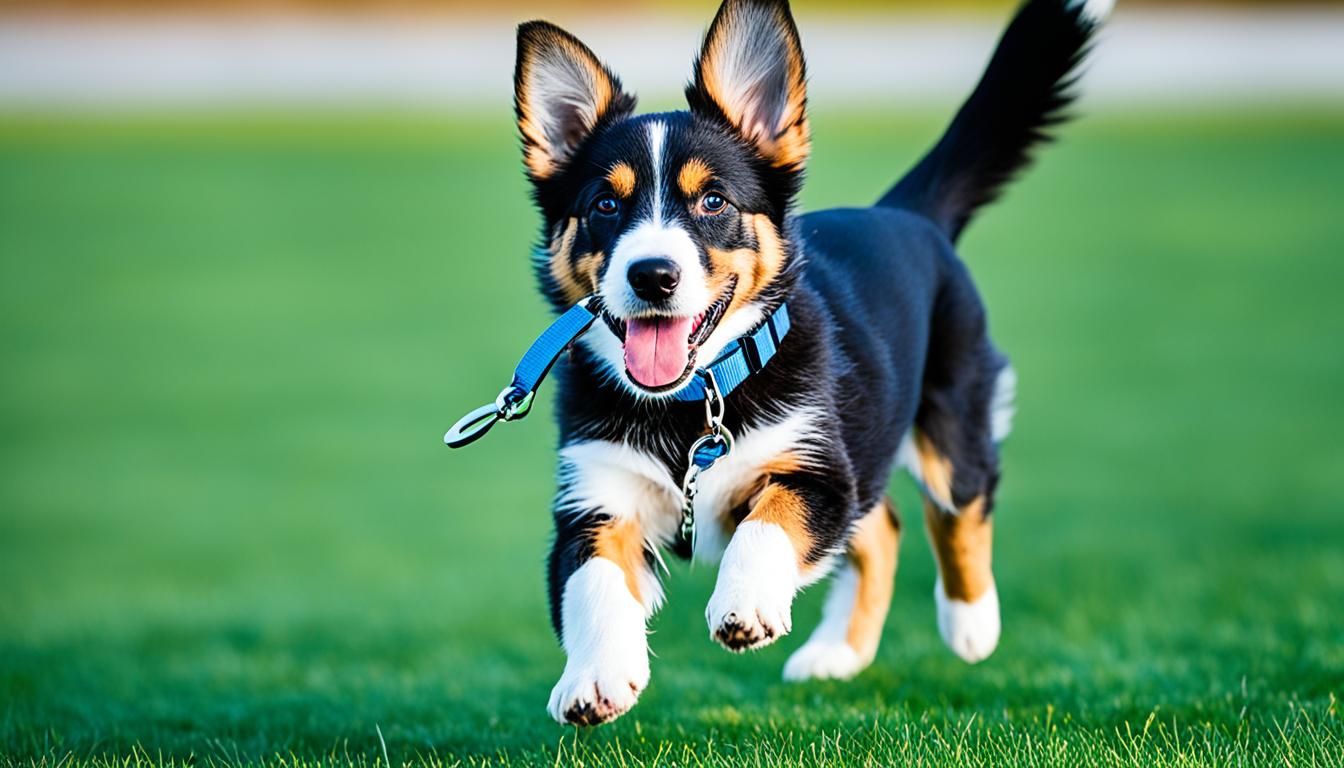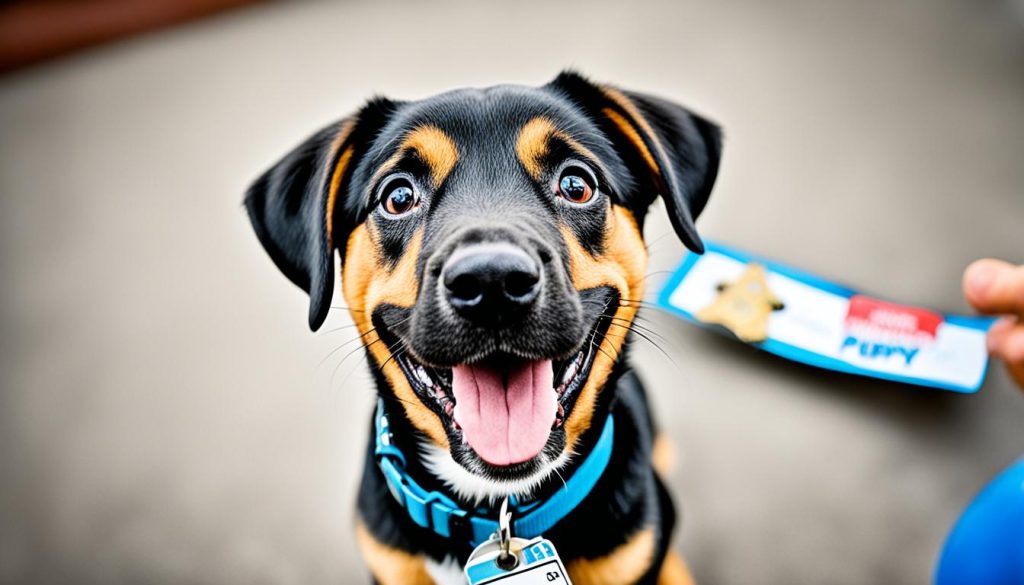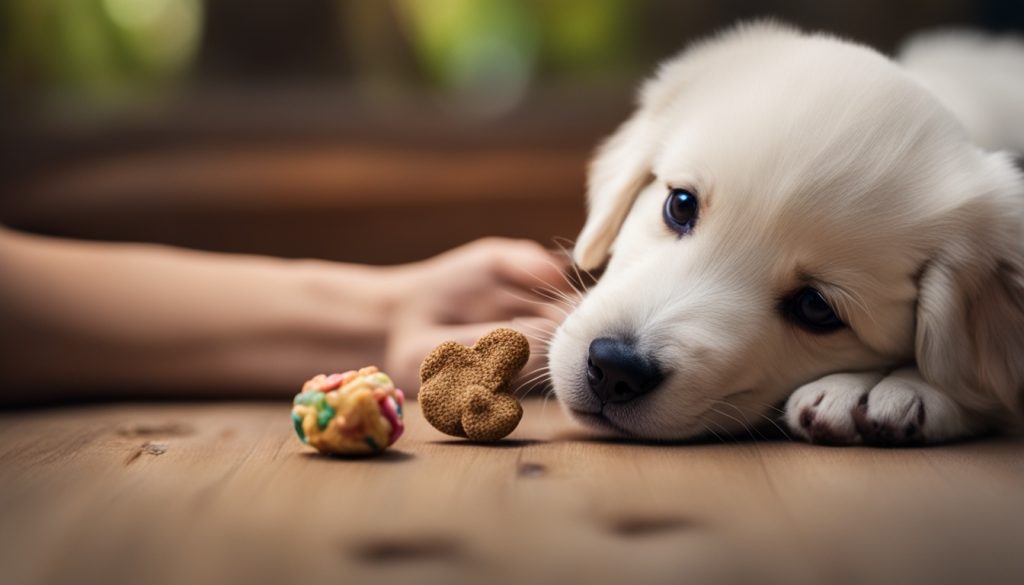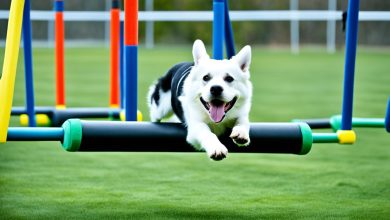Puppy Obedience Tips for New Pet Owners

If you’re a new pet owner, getting your puppy to follow basic commands is key. It takes time and patience to train them right. Here are some essential tips to help you and your new friend succeed.
Key Takeaways:
- Start with simple commands and gradually introduce more complex ones.
- Reward your puppy for recognizing their name to foster positive associations.
- Be consistent in your training methods to establish respect and authority.
- Help your puppy get used to being handled for routine care tasks.
- Socialize your puppy with humans and other pets for proper behavior and friendliness.
Start with Simple Commands
Beginning your puppy’s training should start with simple commands. Terms like “no” and “good” help teach them right from wrong. Consistent and clear commands let you show your expectations and guide them.
As your puppy learns these basic commands, you can start teaching them more things. Like how to sit or lie down. This lets your puppy build their skills over time.
It’s smart to enroll your puppy in training classes for the best obedience training. In these classes, professional trainers help you and your puppy. They focus on good behavior and positive habits. Your puppy also gets to meet other dogs, which is great for their social skills and confidence.
Puppy training classes offer a friendly place where you can meet other dog owners. You can share stories and tips, and get advice on how to train your puppy. These classes also help you and your dog bond.
Using simple commands and joining puppy classes lays a strong base for your puppy’s behavior. Remember, being consistent is important. With patience and positive actions, you’ll see your puppy grow and learn.
Benefits of Starting with Simple Commands:
- Establishes the concept of good and bad behavior.
- Helps your puppy understand your expectations.
- Creates a foundation for further training.
- Gradually introduces more advanced commands.
Reward Your Puppy for Recognizing Their Name
Teaching your puppy to recognize their name is key for their training. When they respond to their name, reward them. This builds a link between their name and good things.
Puppy name recognition is crucial for good communication with your pet. It helps you grab their attention, call them back, and build trust.
Pick a quiet place with no distractions to start training. Say their name in a calm and friendly way. Then wait for them to look at you before you give them a treat.
Using rewards, like treats or praise, works well to teach your puppy. It makes them want to learn and respond to their name. This way, they learn to obey and it strengthens your bond.
“Rewarding your puppy for recognizing their name strengthens obedience and your relationship. With steady rewards and good times, you’re creating a base of trust and communication.”
Being consistent is very important. Keep doing name recognition drills often. Make them harder by adding distractions. Over time, your puppy will get better at knowing their name and coming when called.
Understanding puppy name recognition and reward-based training is vital. Start using these methods with your pet every day. The bond you build will make your puppy more obedient. It will also create a friendship based on love and trust.

Benefits of Reward-Based Training
| Benefits | Explanation |
|---|---|
| Positive Reinforcement | Rewards create motivation and strengthen desired behaviors. |
| Better Bond | Rewarding your puppy fosters a strong emotional connection. |
| Long-Term Recall | Effective name recognition training ensures a reliable recall response. |
| Confidence and Obedience | Positive experiences empower your puppy, making them obedient and confident. |
| Enhances Learning | Reward-based training makes the learning process enjoyable and effective. |
Be Consistent and Get Puppy Used to Being Handled
For successful puppy training, staying consistent is crucial. Consistency in commands and what you expect teaches your puppy to follow your lead. It cuts down on confusion and builds a solid training foundation.
It’s vital to make your puppy comfortable with being touched early on. Gently handle your puppy often, slowly getting them used to different touches like brushing, cutting nails, and cleaning ears. These actions become simpler as your puppy gets older.
Socializing your puppy with people and other pets is key for their growth. Safe exposure to varied beings and places helps them learn to be social and behave well. It teaches them how to act around others.
“Consistency in training and proper handling are crucial for raising a well-behaved and confident puppy.” – Dr. Emma Adams, Canine Behavior Specialist
Forming a strong bond with your puppy through steady training and gentle handling is a lifelong journey. It takes patience, steady effort, and positivity. Stick to these guidelines to help your puppy thrive as a loving and obedient companion.

| Consistency in Puppy Training | Puppy Handling and Care | Puppy Socialization |
|---|---|---|
| Establishes clear communication | Makes routine care tasks easier | Builds social skills and behavior |
| Ensures respect and obedience | Creates positive associations with handling | Promotes friendly interactions |
| Eliminates confusion | Reduces stress during grooming | Prevents fear and aggression |
Conclusion
Getting your puppy to behave well is key for a peaceful life together. Start with easy commands and reward them when they respond to their name. This starts their training off right.
Be consistent and patient with your puppy’s training. Getting them used to being touched helps with grooming and doctor visits. Socializing your puppy is also vital. It makes them friendly and well-behaved.
Training your puppy doesn’t stop; it keeps going. You might need to join puppy training classes for help. These classes offer expert advice and a structured way to learn. With hard work and these tips, your puppy will grow up to be happy and well-mannered!
FAQ
What are some simple commands I can start with to train my puppy?
Should I enroll my puppy in training classes?
How can I teach my puppy to recognize their name?
Why is consistency important in puppy training?
How can I get my puppy used to being handled?
Why is socializing my puppy important?
Source Links
- https://www.thepuppyacademy.com/blog
- https://www.doggonefunmi.com/5-training-tips-for-new-dog-owners.php
- https://www.akc.org/expert-advice/training/basic-obedience-training-for-your-dog/




